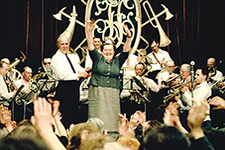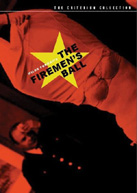The Firemen's Ball (HorÃ, má panenko) [DVD]
|

Filmed in 1966 and released in 1967, just a few weeks before Soviet tanks rumbled in Czechoslovakia, Milos Forman's The Firemen's Ball (HorÃ, má panenko) was a political bombshell barely disguised as a seemingly innocuous comedy of errors. Its brilliance is its multifaceted take on human silliness, as it plays on one level as a hilarious setpiece about the disasters that befall a befuddled group of well-meaning but incompetent firemen trying to stage an elaborate ball for the local townspeople, on a second level as a scathing indictment of the floundering Czech government. On the first level, the jokes are funny; on the second, they are disturbing. Running a barely feature-length 73 minutes, The Firemen's Ball is deceptively simple in a sublime sort of way. It stars a cast composed entirely of nonprofessional actors from a small Czech town where Forman and his coscreenwriters, Jaroslav Papousek, Ivan Passer, and Václav Sasek, went to find solitude and inspiration for their follow-up to Forman's previous film, the international success Loves of a Blonde (1965). Taking place almost entirely within a small town's convention hall, the story of the firemen's ball slowly escalates with dilemma after dilemma, problem after problem, that neither the head of the firemen's committee (Jan Vostrcil), nor any of the committee members, is capable of dealing with or solving. Everything starts on the wrong foot when it is noticed that one of the many raffle prizes--a cake--has been stolen, and, while dealing with that problem, the banner for the ball that has been so painstakingly painted catches fire and burns up. It's never a good sign when the banner at a firemen's ball catches fire and burns up, but that's about the best thing that happens all night. By evening's end, all of the raffle prizes have been stolen, the much-anticipated "beauty contest" has turned into an embarrassing parade of homely girls that eventually devolves into utter chaos, and a nearby house burns to the ground because the firemen are so involved with their ball that they aren't prepared to fight a fire. The shot of several of them shoveling snow onto the burning house is a perfectly captured moment of absolute inadequacy, especially as it is framed as a direct juxtaposition to the banner that burned down early in the movie, which depicted the brave firemen battling the blaze of a burning house and rescuing a little girl. In this way, on an allegorical level, the film as a whole is a near perfect distillation of the failure of the socialist state: While the bureaucracy squabbles amongst itself, disconnected from those below them, yet purporting to have their interests in mind, houses burn down and people steal to survive. By all accounts, The Firemen's Ball should be a one-joke political satire, but Forman brings a level of humanity to the allegorical meltdown that belies its sharply barbed political intentions. While the firemen are intended to stand for the communist political elite then in charge of Czechoslovakia, their characters expand beyond simple symbolism--although largely nameless, they become oddly compelling and sympathetic, even when in the utter throes of their own incompetence. Much like the communists, they hew the "party line" in their undying devotion to the honor of the fire brigade, even when all signs point otherwise. Yet, their devotion is both sadly funny and strangely touching. Even in the absurdity, Forman manages to touch on the underlying humanity, which was one of his greatest skills as a filmmaker and one of the chief characteristics of the Czech New Wave, which, alas, came to an end after the release of The Firemen's Ball due to the Soviet invasion and the final, resounding crash-down of the Iron Curtain. Thankfully, Forman had secured financing from sources outside the country, so The Firemen's Ball was distributed internationally and widely seen (in Czechoslovakia, it was "banned for life"). The fall-out from this film was severe, so severe that it was one of the major impetuses for Forman to leave Czechoslovakia and come to the United States, where he continued to make compelling films. Still, The Firemen's Ball will always stand as one of his supreme achievements--so simple, yet so profound in the way it captures everything that was wrong at that time and in that place.
Copyright © 2002 James Kendrick |
|||||||||||||||||||||||||||||||||||||||||||||||
Overall Rating:



 (3.5)
(3.5)
Subscribe and Follow
Get a daily dose of Africa Leader news through our daily email, its complimentary and keeps you fully up to date with world and business news as well.
News RELEASES
Publish news of your business, community or sports group, personnel appointments, major event and more by submitting a news release to Africa Leader.
More Information
